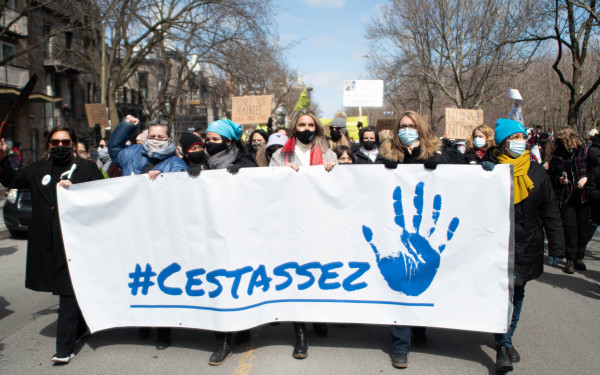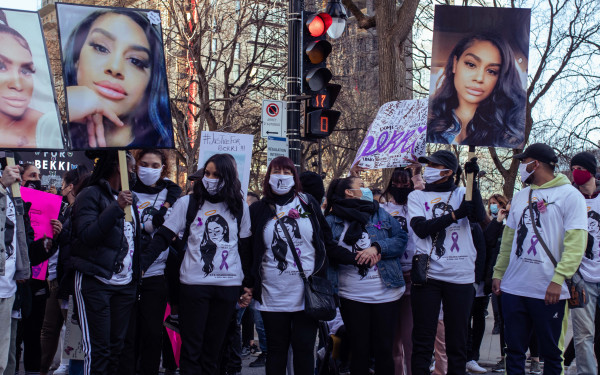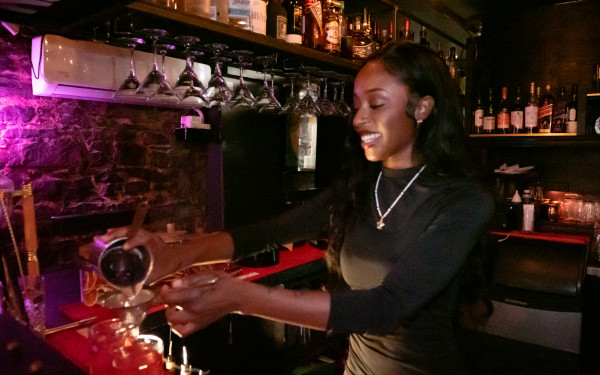Marching Towards a Solution
Protest Speaks to Need for Sexual Assault Centre at ConU
As upwards of 100 people took to the streets of downtown Montreal Friday to participate in the Take Back the Night protest, the message was clear: sexual and gendered
violence needs to stop.
“We need to stop accepting the idea that sexual assault is normal and expected, that if we walk alone at night, if we wear short skirts, if we drink too much, that we should expect sexual assault might happen,” said Julie Michaud, the 2110 Centre for Gender Advocacy’s administrative coordinator.
A Safe Space at School
Friday’s march was organized by Concordia’s 2110 Centre as part of their ongoing campaign to bring a sexual assault centre to Concordia.
The campaign’s objective is to pressure Concordia’s administration to create a new centre on campus that would provide support services to victims of sexual assault and raise awareness of sexual and gendered violence.
“Universities are a pretty intense site of sexual assault and sexual harassment,” said the 2110 Programming and Campaigns Coordinator Bianca Mugyenyi. “It’s really key that as a community, we have services [available to] survivors of sexual assault.”
According to the 2110 Centre, one in four women will experience sexual assault during their post-secondary studies.
Mugyenyi says that a sexual assault centre at Concordia would provide students who have experienced with support, information and referrals.
Such a centre would also help to build a “culture of consent” at the university.
“There’ll be more people available to facilitate workshops and public education programs,” said Hilary King, who is involved in the 2110 Centre’s Sexual Assault Centre Campaign. “It’s not just about a safe space for sexual assault survivors, but a place to start building a campus-wide community that is anti-sexual assault.”
Circle of Support
The Women’s Studies Student Association at Concordia has voted to support the 2110 Centre’s campaign and proposals for a sexual assault centre at the university.
“Sexual assault and sexual violence are real issues,” said WSSA VP Communications Hector Villeda-Martinez. “The university has a responsibility to the student population. Perhaps at school a person can find information, a safe space where they can inquire, where they can seek counsel, where they can seek help.”
Last week, the Concordia Student Union unanimously voted to endorse the WSSA’s position on—and plea for—a sexual assault centre at Concordia.
“The university has been saying that there’s no space for the sexual assault centre,” said CSU VP External Simon-Pierre Lauzon.
“The first step in going about helping the 2110 Centre is to define what space is needed. Then we’ll go talk to the university and find out what their position on this is. From that, we’ll be able to formulate a campaign, a response or whatever is needed.”
In attendance at the march were two members of the Sexual Assault Centre of the McGill Students’ Society, Natalie Geffen and Lily Hoffman; the two support the campaign to create a similar centre at Concordia.
“Creating a space where people can talk about [their] experiences and come to understand what consent and healthy relationships means […] is fundamental to creating a positive and respectful university campus,” said Hoffman.
McGill’s Sexual Assault Centre offers support groups and a phone-in helpline to victims of sexual assault. The centre also has an outreach branch that goes into high schools to talk to students about building healthy and consensual relationships.
Mugyenyi remains optimistic that Concordia will soon have a sexual assault centre of its own. In the meantime, the 2110 Centre’s campaign will keep up the pressure on the university.
“Given the strong support from students, the CSU and the [Graduate Students’ Association], and the momentum of the campaign, I feel optimistic,” said Mugyenyi. “We just need to get the administration on board.”
“Everybody should have the right to be safe wherever they are. We want it to be really clear that nothing you can do makes it okay for somebody to do something to you against your will.”
—Julie Michaud, 2110 Centre for Gender Advocacy Administrative Coordinator
Speaking Out
The first documented Take Back the Night event was held in Philadelphia, PA in 1975 after a young woman was stabbed to death walking home at night. Since then, women’s groups, rape crisis centres, colleges and universities have organized thousands of rallies internationally.
“Everybody should have the right to be safe wherever they are,” said Michaud. “We want it to be really clear that nothing you can do makes it okay for somebody to do something to you against your will.”
According to her, we live in a rape culture which normalizes sexual assault.
“Apologies for rape are all around us—whether it’s in advertising, in films that make light of rape or in the comments of your friends who might tweet something about a chemistry test having ‘raped’ them,” she said. “We need to start challenging this rape culture and start creating a culture of consent.”
The protest also dealt with other issues affecting Canadian women.
Simone Lucas of Women in Cities talked about the need to make public spaces safer through a gender-based approach to municipal planning, and Maya Rolbin-Ghanie from Missing Justice spoke about the hundreds—possibly thousands—of missing or murdered indigenous women in Canada whose cases have not been adequately investigated by the police.
The march began at Norman Bethune Square before proceeding down Guy St., Ste. Catherine St. W., McGill College Ave. and de Maisonneuve Blvd. W. A police escort accompanied protesters along the route.
As they walked, protesters held signs and chanted, “Patriarchy has got to go,” and, “Stop the violence, stop the rape.”
The march ended at the terrace behind Concordia’s Hall Building, which was identified by Women in Cities as one of the least women-friendly places on campus, since it is secluded and lacks sufficient lighting at night.

1_700_1050_90.jpg)
2_900_600_90.jpg)
5_700_1049_90.jpg)



1_600_375_90_s_c1.jpg)

